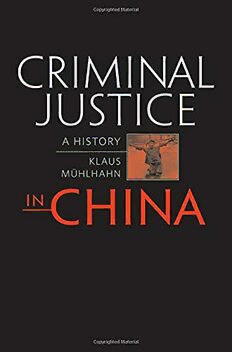
Criminal Justice in China: A History PDF
Preview Criminal Justice in China: A History
CRIMINAL JUSTICE IN CHINA Blank Page CRIMINAL JUSTICE IN CHINA A History KLAUS MUHLHAHN HARVARD UNIVERSITY PRESS Cambridge, Massachusetts, and London, England 2009 Copyright © 2009 by the President and Fellows of Harvard College All rights reserved Printed in the United States of America Library of Congress Cataloging-in-Publication Data Muhlhahn, Klaus Criminal justice in China: a history I Klaus Muhlhahn. p. cm. Includes bibliographical references and index. ISBN 978-0-674-03323-8 (alk. paper) L Criminal justice, Administration of-China-History. I. Title. KNN1572.M84 2009 2008047378 CONTENTS Introduction 1 L The Right Degree of Pain: Imperial China 14 2. The Prison Regime: Republican China 58 3. Trials of Terror: War and Revolution 127 4. Reform through Labor: The Communist State 175 Conclusion 284 Abbreviations 299 Archives 301 Acknowledgments 303 Notes 305 Index 353 Blank Page CRIMINAL JUSTICE IN CHINA Blank Page INTRODUCTION GER. Disgust. Fear. These words describe the reactions of the major ty of Americans and Europeans toward what they hear about criminal justice in China. Their negative impressions are further nurtured by successful and highly influential Hollywood movies such as the 1997 film Red Corner, in which Richard Gere plays an innocent Ameri can businessman who is incarcerated and maltreated in a Chinese prison. Memoirs of Chinese dissidents and frequent newspaper reports about human rights violations contribute to the dark picture. Though some of the allegations are undoubtedly true, negative reactions do little to help Westerners understand the forces behind criminal justice in China, and they are also not helpful in formulating well-reasoned political responses. Such responses require a comprehensive knowledge of the whole of crimi nal justice in China: its past and present, the underlying values and theo ries, its practices and consequences, its capacities and failures, and, last but not least, the human costs and experiences. The complex history of criminal justice in China-what we actually can know as opposed to what we imagine-is the subject of this book. An examination of China's crimi nal justice system in the past will tell us something about its present and also prepare us for the future by highlighting the major shifts and dynamics that produced and continue to influence the administration of justice in China. In charting this sensitive, difficult, and partially unknown terrain, a his torical approach will aid in understanding the overall role of criminal jus- Introduction 2 tice in Chinese social life and its effects on both state and society. Seen as a historical and social phenomenon, criminal justice is revealed as part of the wider culture, shaping and being shaped by it. It says as much about the society that holds trials and sentences offenders as it does about those indi viduals brought before it. Criminal justice in China reflects fundamental norms, core values, and significant social hierarchies and relationships in modern Chinese society. Crime, Punishment, and Justice Justice is, as John Rawls has put it, "the first virtue of social institutions:'1 Institutions, no matter how efficient and well arranged, become weak and dysfunctional if they are perceived as unjust. To achieve its objectives suc cessfully, the administration of justice and dispute settlement must be ac cepted as authoritative and legitimate, and it must also be seen as fair. Phi losophers have distinguished between two ways of creating fair judgments and compensation: corrective justice covers that which is due to a person as punishment; distributive justice is that which is due by way of benefits and burdens other than punishments.2 Criminal justice falls within the realm of corrective justice. It aims at producing justice by way of amending a previ ous injustice. The parties, as perpetrator and sufferer of the same injustice, are the active and passive poles of a single wrong, which the law rectifies and redeems by holding the perpetrator liable to the victim. Society's response to socially proscribed wrongdoing usually consists in the punishment of the offender. Pronouncing guilt and finding a correct punishment are at the core of criminal justice. Punishment is one of the oldest human institutions; virtually every society in history has imposed some kind of penalty on those who offend against written and unwritten rules.3 Beyond that, most religions, too, hold that those who offend against god, or the gods, will be punished either in this world or the next. But pun ishment is of course not the only way to react to crime. Other reactions may include payment of compensation to the victim, expression of formal censure, or attempts at reconciliation. Punishment is distinguished from other responses by the hard treatment it imposes-most commonly, the infliction of some pain or loss on the transgressor. Punishments thus need to be justified exactly, because they involve doing things that are normally considered to be wrong (depriving a person of life, property, or freedom).
